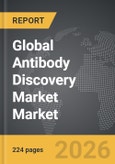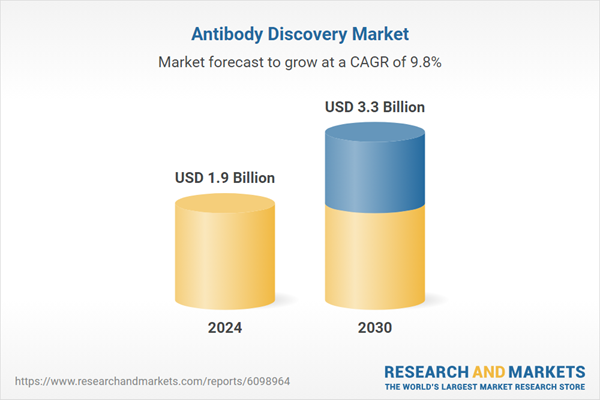Global Antibody Discovery Market - Key Trends & Drivers Summarized
Why Is Antibody Discovery at the Forefront of Next-Generation Therapeutic Development?
Antibody discovery is emerging as a cornerstone of modern drug development, driven by the escalating demand for targeted therapies across oncology, autoimmune disorders, infectious diseases, and rare conditions. Monoclonal antibodies (mAbs), bispecific antibodies, and antibody-drug conjugates (ADCs) are transforming clinical outcomes through their high specificity, tunable pharmacokinetics, and ability to engage or inhibit precise molecular targets. The discovery phase - encompassing target identification, antibody generation, screening, and lead optimization - is critical to ensuring downstream therapeutic efficacy, safety, and commercial viability. As biopharmaceutical pipelines increasingly prioritize biologics over small molecules, antibody discovery is becoming an indispensable gateway to innovation.A significant driver of this trend is the surge in demand for personalized medicine and immunotherapy, where antibody-based therapeutics are used to modulate immune response, block disease-associated pathways, or deliver cytotoxic payloads directly to tumor cells. The urgency created by the COVID-19 pandemic further underscored the importance of rapid antibody discovery, as neutralizing antibodies became pivotal in the therapeutic and diagnostic response to SARS-CoV-2. Global interest in therapeutic antibodies is prompting pharmaceutical and biotech firms to accelerate discovery programs using faster, more predictive, and less immunogenic methods. As the market shifts from traditional hybridoma techniques to humanized platforms and next-gen in silico approaches, antibody discovery is positioned at the heart of biopharma R&D strategies worldwide.
How Are Technological Innovations Accelerating Discovery Timelines and Improving Lead Quality?
Cutting-edge technologies are reshaping every stage of the antibody discovery process, enabling faster identification of high-affinity, developable antibodies with favorable safety and manufacturability profiles. Phage display and yeast display platforms have largely replaced traditional hybridoma-based generation, offering vast diversity libraries and rapid selection capabilities. More recently, microfluidics, single B-cell screening, and high-throughput sequencing have revolutionized early-stage discovery by capturing naturally occurring antibody repertoires from immunized animals or convalescent human donors. These tools enable the isolation of rare, highly potent antibodies that would otherwise go undetected through conventional methods.Computational biology and AI-driven design are also transforming the discovery pipeline by predicting binding affinity, stability, immunogenicity, and epitope specificity in silico. Machine learning algorithms are being trained on large antibody datasets to accelerate lead optimization, reduce experimental trial-and-error, and improve success rates in later development phases. Humanization techniques - ranging from chimerization to full deimmunization - are being refined to enhance safety and reduce rejection risk. Additionally, CRISPR/Cas9 and transgenic animal models are being leveraged to generate fully human antibodies with precise specificity. These technology integrations are enabling rapid, scalable, and cost-efficient antibody discovery workflows that meet the high standards of regulatory and therapeutic rigor.
Where Is Market Demand Rising and Which Therapeutic Areas Are Driving Discovery Investment?
Market demand for antibody discovery services and platforms is rising sharply across North America, Europe, and Asia-Pacific, where biopharma companies, academic labs, and contract research organizations (CROs) are intensifying efforts to expand antibody-based pipelines. The U.S. leads in therapeutic antibody development, backed by significant biotech investment, advanced research infrastructure, and regulatory support for expedited biologic approvals. Europe, particularly Germany, Switzerland, and the U.K., is seeing strong growth in CRO-based discovery partnerships and academic spinouts. Meanwhile, Asia-Pacific - especially China, South Korea, and Japan - is becoming a major hub for antibody innovation, fueled by state-backed biotech programs, growing clinical trial activity, and rapid commercialization strategies.Oncology remains the largest and fastest-growing therapeutic segment for antibody discovery, accounting for the majority of pipeline activity in monoclonal and bispecific antibodies. Immuno-oncology applications, such as checkpoint inhibitors and T-cell engagers, are expanding rapidly with significant investment in PD-1/PD-L1, CTLA-4, CD3, and CD20 targets. Autoimmune and inflammatory diseases - including rheumatoid arthritis, psoriasis, and Crohn's disease - also represent major discovery areas, with antibody candidates aimed at cytokines and immune receptors such as IL-6, TNF-alpha, and IL-17. Infectious disease research continues to drive antibody discovery in the wake of COVID-19, with new programs targeting HIV, RSV, and influenza. Rare and neurological diseases, including ALS, Alzheimer's, and neuromyelitis optica, are emerging as high-value niches for precision antibody therapies. These diverse and expanding indications are propelling sustained investment and innovation in antibody discovery workflows across sectors.
What Is Fueling the Growth of the Global Antibody Discovery Market?
The growth in the antibody discovery market is driven by several factors, including the rising prevalence of chronic and rare diseases, expansion of biologics pipelines, and breakthroughs in molecular screening and AI-assisted drug design. A central driver is the therapeutic success of antibodies already in the market - such as trastuzumab, adalimumab, and pembrolizumab - which continue to demonstrate the clinical and commercial potential of antibody-based drugs. The robust deal activity between pharmaceutical giants and antibody discovery specialists is further catalyzing growth, as companies seek early access to differentiated platforms and promising candidates.Increased outsourcing by biotech startups and mid-sized firms is also fueling market demand for discovery-as-a-service models, where CROs and specialized technology vendors provide end-to-end discovery capabilities from antigen design to humanized lead delivery. Advances in automation, sequencing, and data analytics are lowering the cost per discovery while improving success predictability, making antibody R&D more accessible to smaller players. Moreover, government and institutional funding for pandemic preparedness, cancer immunotherapy, and biosimilar development are boosting both public and private sector involvement. As antibody therapeutics become increasingly central to precision medicine and immune modulation, a crucial question emerges: Can antibody discovery platforms keep pace with the clinical complexity and specificity required for next-generation, globally accessible biologic treatments?
Report Scope
The report analyzes the Antibody Discovery market, presented in terms of market value (US$). The analysis covers the key segments and geographic regions outlined below:- Segments: Antibody Type (Monoclonal, Polyclonal, Other Antibody Types); Service (Phage Display, Hybridoma, Other Services); End-Use (Pharmaceutical & Biotechnology Companies, Research Laboratories, Other End-Uses).
- Geographic Regions/Countries: World; United States; Canada; Japan; China; Europe (France; Germany; Italy; United Kingdom; and Rest of Europe); Asia-Pacific; Rest of World.
Some of the 41 companies featured in this Antibody Discovery market report include -
- Abcam plc
- AbCellera Biologics Inc.
- Ablexis, LLC
- Adimab LLC
- Akeso Biopharma
- Biocytogen Pharmaceuticals Co., Ltd.
- Bruker Corporation
- Charles River Laboratories
- ChemPartner
- Creative Biolabs
- Danaher Corporation
- Eurofins Scientific
- Evotec SE
- FairJourney Biologics S.A.
- Genmab A/S
- GenScript Biotech Corporation
- Harbour BioMed
- Icosagen AS
- ImmunoPrecise Antibodies Ltd.
- Isogenica Ltd.
Key Insights:
- Market Growth: Understand the significant growth trajectory of the Monoclonal Antibody segment, which is expected to reach US$2 Billion by 2030 with a CAGR of a 9.3%. The Polyclonal Antibody segment is also set to grow at 10.9% CAGR over the analysis period.
- Regional Analysis: Gain insights into the U.S. market, valued at $500 Million in 2024, and China, forecasted to grow at an impressive 9.5% CAGR to reach $530.7 Million by 2030. Discover growth trends in other key regions, including Japan, Canada, Germany, and the Asia-Pacific.
Why You Should Buy This Report:
- Detailed Market Analysis: Access a thorough analysis of the Global Antibody Discovery Market, covering all major geographic regions and market segments.
- Competitive Insights: Get an overview of the competitive landscape, including the market presence of major players across different geographies.
- Future Trends and Drivers: Understand the key trends and drivers shaping the future of the Global Antibody Discovery Market.
- Actionable Insights: Benefit from actionable insights that can help you identify new revenue opportunities and make strategic business decisions.
Key Questions Answered:
- How is the Global Antibody Discovery Market expected to evolve by 2030?
- What are the main drivers and restraints affecting the market?
- Which market segments will grow the most over the forecast period?
- How will market shares for different regions and segments change by 2030?
- Who are the leading players in the market, and what are their prospects?
Report Features:
- Comprehensive Market Data: Independent analysis of annual sales and market forecasts in US$ Million from 2024 to 2030.
- In-Depth Regional Analysis: Detailed insights into key markets, including the U.S., China, Japan, Canada, Europe, Asia-Pacific, Latin America, Middle East, and Africa.
- Company Profiles: Coverage of players such as 3M Company, Berk International, LLC, Carewell, Clinicept Healthcare Ltd., DuPont de Nemours, Inc. and more.
- Complimentary Updates: Receive free report updates for one year to keep you informed of the latest market developments.
Select Competitors (Total 41 Featured):
- Abcam plc
- AbCellera Biologics Inc.
- Ablexis, LLC
- Adimab LLC
- Akeso Biopharma
- Biocytogen Pharmaceuticals Co., Ltd.
- Bruker Corporation
- Charles River Laboratories
- ChemPartner
- Creative Biolabs
- Danaher Corporation
- Eurofins Scientific
- Evotec SE
- FairJourney Biologics S.A.
- Genmab A/S
- GenScript Biotech Corporation
- Harbour BioMed
- Icosagen AS
- ImmunoPrecise Antibodies Ltd.
- Isogenica Ltd.
This edition integrates the latest global trade and economic shifts into comprehensive market analysis. Key updates include:
- Tariff and Trade Impact: Insights into global tariff negotiations across 180+ countries, with analysis of supply chain turbulence, sourcing disruptions, and geographic realignment. Special focus on 2025 as a pivotal year for trade tensions, including updated perspectives on the Trump-era tariffs.
- Adjusted Forecasts and Analytics: Revised global and regional market forecasts through 2030, incorporating tariff effects, economic uncertainty, and structural changes in globalization. Includes historical analysis from 2015 to 2023.
- Strategic Market Dynamics: Evaluation of revised market prospects, regional outlooks, and key economic indicators such as population and urbanization trends.
- Innovation & Technology Trends: Latest developments in product and process innovation, emerging technologies, and key industry drivers shaping the competitive landscape.
- Competitive Intelligence: Updated global market share estimates for 2025, competitive positioning of major players (Strong/Active/Niche/Trivial), and refined focus on leading global brands and core players.
- Expert Insight & Commentary: Strategic analysis from economists, trade experts, and domain specialists to contextualize market shifts and identify emerging opportunities.
Table of Contents
Companies Mentioned (Partial List)
A selection of companies mentioned in this report includes, but is not limited to:
- Abcam plc
- AbCellera Biologics Inc.
- Ablexis, LLC
- Adimab LLC
- Akeso Biopharma
- Biocytogen Pharmaceuticals Co., Ltd.
- Bruker Corporation
- Charles River Laboratories
- ChemPartner
- Creative Biolabs
- Danaher Corporation
- Eurofins Scientific
- Evotec SE
- FairJourney Biologics S.A.
- Genmab A/S
- GenScript Biotech Corporation
- Harbour BioMed
- Icosagen AS
- ImmunoPrecise Antibodies Ltd.
- Isogenica Ltd.
Table Information
| Report Attribute | Details |
|---|---|
| No. of Pages | 224 |
| Published | February 2026 |
| Forecast Period | 2024 - 2030 |
| Estimated Market Value ( USD | $ 1.9 Billion |
| Forecasted Market Value ( USD | $ 3.3 Billion |
| Compound Annual Growth Rate | 9.8% |
| Regions Covered | Global |









